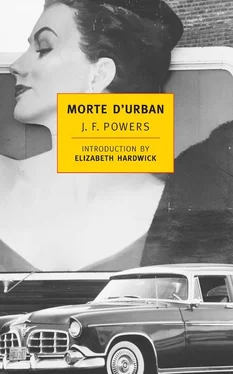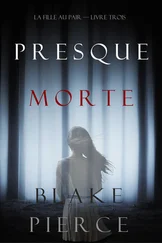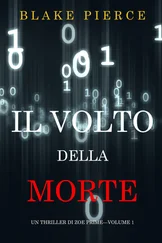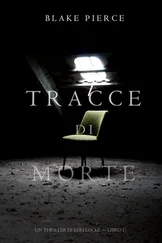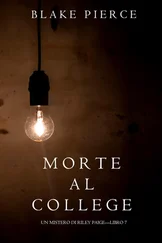Father Urban had encountered others who held this limited view of the priesthood, but with Monsignor Renton it was a cause. He carried it into the confessional where, of course, he had Father Urban at an unfair advantage. “Ah, yes. We’re here today, and gone tomorrow, and while we’re here we more or less run on divine momentum — more, if we happen to be priests. We’d do well to keep that in mind at all times, and perform those few sacred offices for which we’ve been chosen by God, and forget the rest. Oh, of course, we’re entitled to a little harmless relaxation. And, whatever else we do, let’s not put ourselves between God and the people — or let them put us between them and Him as too often happens nowadays. Ah, yes. Now, for your penance, pray for the Carmelites. Meditate on the life of those poor men and women. Let’s say a half hour a day for the next week, and you might pray for the Trappists, too, if you get a chance. Now make a good act of contrition, and pray for my intention.”
Father Urban had had trouble with confessors in the past. For some reason, men he’d select for their mature outlook, men who’d appear to be well aware of their spiritual and intellectual limitations before and after, wouldn’t be able to resist the temptation to show off while they had Father Urban in the confessional. The case of Monsignor Renton was somewhat different. He, too, had changed, but only once. He was now the same in and out of the box. He just wasn’t the man Father Urban had asked to be his confessor on the night they’d met — a man chosen not only for his mature outlook but for his availability and status in the diocese. Monsignor Renton had talked less and listened more on that night. He hadn’t been the same since.
Father Urban listened in long-suffering silence the next time he went to confession, while the man ground his ax and made points he wouldn’t have been able to get away with in the upper room, but when he cited the case of the young pastor—“a fine young fella”—who had driven himself into a mental institution “as a result of overindulgence in spurious activity,” and now, during meals, walked around the dining hall saying “hello” to the other patients because life had become a never-ending parish supper to him, Father Urban cut in: “Why are you telling me this?” “Pray for him, Father. That will be your penance this time. Forty years ago, we weren’t expected to do so much selling, nagging, and hand-holding. Ah, well. Now make a good act of contrition, and pray for my intention.”
Father Urban knew where he was with himself, and Monsignor Renton’s effect on him, in or out of the confessional, would be small. For himself, he wasn’t worried. But what of the man’s effect on Phil? Even before Father Urban discovered what was almost certainly behind Monsignor Renton’s opposition to a new church — the old church — Father Urban had regarded the man as a bad influence on Phil, and since then had been trying to counteract that influence. Uphill work. Phil was weak, Monsignor Renton was strong, and Father Urban, though strong, had no desire to come between old friends. Hence his sometimes halting speech, his turning of the other cheek. “ Your ass is out, Father ”—“ And yet, Monsignor …”
That was how it had gone again, in the upper room, on New Year’s Eve, and was still going, much later.
Monsignor Renton, who had an edge on, said: “Frankly, if I had to put up a new church — one of these hatcheries, with silo attached — I think I’d rather cut my throat.”
“Fortunately, you don’t have to do either,” Father Urban said, taking a harder line with the man, and keeping the issue before Phil.
“If I had my way, there’d be a church down in Orchard Park.”
“If,” said Father Urban.
Phil, sunk in his chair, said, “Has there been any more talk of that, Red?”
All such talk began and ended with Monsignor Renton, Father Urban knew. Phil must have known it, too, but he was hoping. Wasn’t it cruel of Monsignor Renton to hold out this hope to Phil?
Monsignor Renton said he wasn’t getting anywhere with the other consultors. “They’re years behind me in their thinking.”
“And drinking,” said Father Urban.
“Oh, I don’t say the present population warrants it, but give ’em time.” Monsignor Renton cited the case of the pastor (“No, not in this diocese”) who had enlarged his plant, both school and church, to accommodate a housing development, and then had been left holding the bag when a new bishop came in and built right in the development. “I wouldn’t like to see that happen to Phil.”
“What would you like to see happen to Phil?”
Monsignor Renton, not answering the question, got up and went to the window facing the street. It was time for one of his curates to come for him and Phil. It was ninety miles to the North Coast Limited’s nearest stop. “Those two jokers of mine! Never know where they are! And they want me to pay for the gas! That’s one problem you don’t have, Phil.”
“No,” said Father Urban. Phil always knew where Johnny Chumley was — in church or in bed.
“Should be two kinds of men in every busy parish,” Phil said. “Priest-priests and priest-promoters. Johnny says.”
“The boy has a good mind for an ex-athlete,” said Monsignor Renton.
“I take it he wants to be one of the priest-priests?” said Father Urban.
Phil made no reply, but Father Urban didn’t regard his silence as pointed. Often, in conversation late at night in the upper room, Phil just conked out. Phil had a big ditch in his personality, and when he was down in it, as he appeared to be now, he was very quiet. “I’m neither,” he said presently.
“I wouldn’t say that,” Father Urban said, though he was afraid Phil was right. “Which one would be the boss? Did he say?” Father Urban was thinking of the weeks ahead with the curate.
“You’ll have to ask him about that,” Phil said.
“Has a good mind,” said Monsignor Renton.
“He may have a good mind, but I’m not so sure he’s right about this,” Father Urban said, addressing himself to Phil. “When you consider what’s at stake”—not only the spiritual welfare of Phil’s people but Phil’s own soul was at stake—“I’d say a man has to be both. At least a man can try. Sometimes that’s the most a man can do.” Father Urban paused to give Phil a chance to think it over, and Phil really did appear to be doing this. Phil had drunk more than usual that night, hoping, he said, to rest better on the train, and this may have been a factor in Father Urban’s favor. “Phil, a man can be both.”
“Like Jekyll and Hyde,” said Monsignor Renton.
“ Otherwise , we wouldn’t be placed in the position we are, placed under the necessity to be both .” For a moment there, before, Father Urban had been getting through to Phil, but now Phil was gone — he was down in his ditch. And who had put him there? His best friend, and worst enemy — who now, commenting as he had before on Orchard Park, whose windows, yards, and rooftops were all lit up for Christmas, said: “The fires of hell, and in the summertime, with those barbecue pits going, it smells like Afghanistan. Used to be a great place for ducks, didn’t it, Phil? Right on the flyway. Oh well.”
“Red, you might as well know it now,” Phil said. “I’m building.”
Monsignor Renton wheeled around. “Holy Paul!”
“Congratulations, Phil,” said Father Urban. “Wonderful.”
For the moment, Monsignor Renton was silent, again gazing out the window.
But he would have Phil to himself for the next month, and doubtless would do his damnedest to get him to change his mind. Phil had to be shored up against him, strengthened in his great decision, committed to it irrevocably, if possible. “Have you told the Bishop, Phil?” said Father Urban.
Читать дальше
